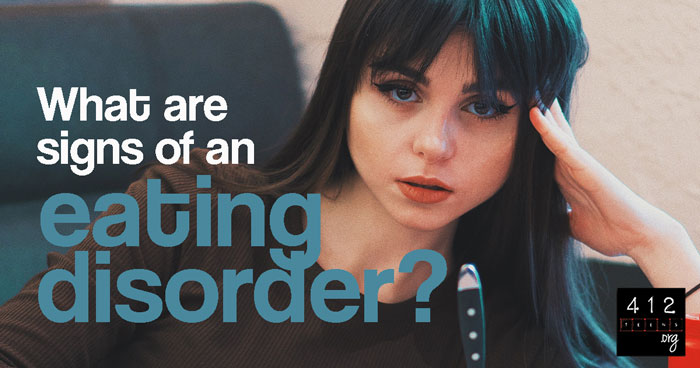What are some signs of an eating disorder?

CW: eating disorders, suicide, self-harm
What's the difference between being too busy to eat and intentionally missing meals? Where's the line between not liking some foods and being physically or emotionally unable to eat them? How can you know if you or someone you love has a naturally low appetite or if they have an eating disorder?
Countless questions surround eating disorders, a mental health condition that is considered very challenging to diagnose and treat. If you’ve been asking any of those questions, either for yourself or for a friend, your most powerful tools will be education and honesty.
Please know that there is no shame in any possible medical or mental health diagnosis of any kind. In John 9, when Jesus encounters a blind man, He stresses that his ailment has nothing to do with sin. The same could be said of any sickness: it is NOT a sin to have an eating disorder—just as it's NOT a sin to have a broken bone, cancer, or a cold. Eating disorders are serious illnesses that include a complex web of physical, mental, emotional, and spiritual factors.
You are not "bad" if you have an eating disorder.
You are not deserving of punishment. You are not a burden when you admit that you’re struggling. As a beloved child of God, you are worth receiving love, compassion, and healing (John 1:12; Romans 8:14; Psalm 86:15). Your healing begins with the truth, offered in love, with no judgment or shame.
You are also not alone.
In the United States alone, at least 30 million people of all ages and genders struggle with eating disorders. Eating disorders don’t discriminate, and no matter who you are, what your body looks like, or what your background is, you don’t have to prove that you’re the “type of person who has a real disorder.” In fact, believing that your struggle is invalid, that you are not “sick enough,” is one of the most universal traits shared by all eating disorders.
If any of this sounds familiar…
If you find yourself reading some of these descriptions and thinking one might fit you, please invite a trusted friend or family member to review this with you. They may be able to offer some outside perspective. If you or your trusted support person thinks there is even a chance that these symptoms might describe you, it’s worth talking to your doctor or to an eating disorder educated counselor. Eating disorders do not make you bad or wrong, but they are a serious threat to your wellbeing and even to your life. If you’re able to identify and get help quickly, the lifelong physical and mental toll can be greatly reduced.
General Warning Signs of an Eating Disorder
All eating disorders involve behaviors around food that are compulsive (near impossible to resist), frequent enough to be considered a pattern, and intrusive enough to interfere with your daily life. Although some eating disorders can originate as a response to factors in your environment (such as trauma, bullying, or abuse), they can also happen totally independently or due to genetic traits in your family.
Many eating disorders (though not all) come with intense discomfort and distress around your body and how you perceive your appearance, creating a hyper-focus on weight and other physical traits. Some of the other common emotional signs include: a desire to isolate, feelings of worthlessness, a sense of being powerless, anxiety, depression, extreme perfectionism, and self-critical thoughts.
Anorexia
Anorexia may be the most widely discussed (and stereotyped) eating disorder when it comes to the media. Anorexia Nervosa is characterized by an intense fear of gaining weight and a preoccupation with food composition and calories. This often leads to rigid rules and rituals around foods, refusing to eat many foods (behavior known as "restricting"), and serious malnourishment. Over-exercise to “burn off” calories is also common, even if the exercise causes significant physical harm. Most individuals diagnosed with anorexia have a very distorted perception of their size—a symptom known as "body dysmorphia" (which can also be a totally separate disorder in itself). Contrary to popular belief, anorexia can include purging behaviors as well.
Sufferers are put in extreme physical danger and are at risk of death from their heart atrophying or from malnutrition. They also suffer from a dramatically increased risk of suicide. Other physical effects include: dangerously low heart rate or blood pressure; amenorrhea in women (losing their period); intolerance to cold; brittle skin, nails, hair, and bones; fatigue; insomnia; and slowed thinking and decision making due to a starved brain.
Bulimia
Bulimia Nervosa is primarily characterized by a cycle of binging (eating large quantities of food in a very short period of time, usually in secret) and purging (throwing up or overuse of laxatives/diuretics). Although bulimia has often been less discussed and more stigmatized in books, movies, and TV shows, bulimia is actually more common than anorexia and can be an equally dangerous and devastating experience. Bulimia can result in electrolyte imbalances, especially potassium imbalances, that can lead to cardiac arrest.
Like anorexia, bulimia can be present in both women and men at any body size. Bulimia sufferers are also very preoccupied with their body image and distressed by what they see, and they can also have restricting tendencies. Some other physical effects can include: acid reflux, eroded teeth from stomach acid wearing away the enamel, and digestion problems from laxative abuse.
Binge Eating Disorder
Someone with Binge Eating Disorder (BED) has recurrent episodes of binging (eating large quantities of food in a very short period of time, usually in secret) but without purging. They often have a feeling of “zoning out” while eating and usually experience intense shame afterward.
Although BED is very common, it has only recently been officially classified as an eating disorder. This means that there are still large gaps in the research. However, initial research has found BED to be more prevalent than anorexia and bulimia combined. BED creates a significant impact on sufferer’s metabolism and digestive system, as well as placing a financial and scheduling burden on people who find their money and time consumed by binges.
OSFED (Other Specified Feeding or Eating Disorder)
Other Specified Feeding or Eating Disorder is a category used to describe those who might experience a mix of any of the disorders discussed above but without fully meeting criteria for any one disorder. The OSFED diagnosis exists as proof that no matter which combination of disordered behaviors you might be experiencing, your disorder is REAL and serious and deserves attention, care, and healing.
Some recently developing categories within OSFED include Orthorexia (restricting foods and categories of foods with the mindset of only wanting to eat what is “healthy” or “clean”) and ARFID (Avoidant-Restrictive Food Intake Disorder, where sufferers experience debilitating sensory issues with food taste and texture).
If you or a loved one might have an eating disorder...
If you've made it this far, chances are you or someone you love has been living in pain, shame, or fear surrounding body image and eating. Please know that no matter what your struggle is, it IS possible to recover. If this article has given you cause for concern for yourself or a loved one, the most important thing you can do is talk to someone—preferably someone who has the ability to connect with professionals if needed.
Eating disorders should be viewed as chronic illnesses that need long term treatment game plans, yet with proper care, you CAN get better and experience life with so much more freedom. You are fearfully and wonderfully made (Psalm 139:14), and no lie an eating disorder tells you could ever make God love you any less (Romans 8:38-39). I hope you hear those truths about who you are clearer than anything else in this list.
ALSO SEE:
- Should a Christian see a psychologist, psychiatrist, or counselor?
- Should a Christian take anti-depressants or other mental health medicines?
- What are the signs of suicidal ideation?
- Is being depressed a sin?
- What does the Bible say about self harm?
SOURCES:


TL;DR
Eating disorders are complex mental and physical illnesses that can come with a wide array of symptoms. No lie an eating disorder tells you could ever make God love you less (Romans 8:38-39). Eating disorders are not sins that deserve punishment; they are illnesses that deserve healing, compassion, and care.

Writer & Consulting Editor: Mary Nikkel
Mary is a music and nonprofit writer passionate about telling purposeful stories about music, meaning, and mental health. She currently serves as Senior Content Manager for anti-human trafficking nonprofit The Exodus Road as well as providing PR services to bands and start-up nonprofits.
